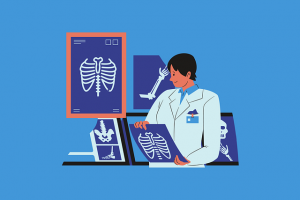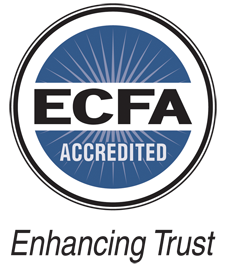Good to the Bone

Students finds goodness is a Christian home.
Growing up in the fast paced, diverse city of Karachi, Pakistan was very different from living in Ohio for *Eria, an Orthopedic Research Fellow at Ohio State University’ Wexner Medical Center.
“It was always sunny and warm,” she chuckles.
Despite the appealing climate, Eria’s childhood was faced with several challenges. The high crime rates made it unsafe for women to walk the streets alone at certain parts of the day. Women also were limited in their educational opportunities. In addition, her community (within a developing nation) did not have immediate access to many of the utilities and health benefits that Americans do. This context helped Eria develop a resilient attitude, as she and the people in her predominately Muslim community learned to work their way around these issues. Still, that fortitude might have been inside her all along.
“When I was a little girl, I would wear a wedding dress to every party I went to. I would also offer the hosts the opportunity to see me dance to my favorite song. I was not a shy child.”
She was, however, a very smart child who loved the sciences. Studying biology came easily, and she enjoyed it immensely. Considering that children from Pakistani families typically follow in the career path of their parents, this could have led to a conflict in her home (her father is an informational technologist). Thankfully, her parents were very supportive of her educational goals.
“I think people should choose a field that they enjoy. My choices are determined by what I enjoy the most.”
But if I say, “I will not mention his word or speak anymore in his name,” his word is in my heart like a fire, a fire shut up in my bones. I am weary of holding it in; indeed, I cannot. (Jeremiah 20:9)
 This led to her studying at the Aga Khan University, the top medical university in Pakistan. She settled on orthopedics, a challenging, highly competitive, and male dominated field involving long and tedious hours. But why?
This led to her studying at the Aga Khan University, the top medical university in Pakistan. She settled on orthopedics, a challenging, highly competitive, and male dominated field involving long and tedious hours. But why?
“It’s rewarding that patients are often very happy to see direct results from the procedures. But personally, when I was a part of the surgeries, I didn’t realize any time had passed. I later realized that I liked invasive surgeries, because I can go inside the human body, appreciate its complex anatomy, and fix the issues for myself.”
This desire to take a look at the inside of unfamiliar places led Eria to take an opportunity to travel to the United States for a clinical elective, shadowing American orthopedic surgeons for four weeks at the Kansas University Medical Center. She appreciated the lack of professional hierarchy among the medical staff, the polite feedback from her coworkers, and the punctuality of the medical personnel. All of this made her want to work in the United States.
After returning to Pakistan to graduate, Eria sought an opportunity to return to the States. She decided to complete her residency at the OSU; but unlike during her first experience, her living arrangements would not be handled by the university.
“In Pakistan, we have very interdependent families. So with coming to America, I was anxious about trying to build a life on my own. I didn’t know anyone, and I didn’t have the finances to stay in a hotel for an extended period of time.”
Thankfully, Eria befriended another Pakistani student moving to Columbus who had connected with IFI. Her friend connected her with Rich Mendola, IFI’s CEO, who arranged for Eria to stay with *Jim Drake and his wife, a Christian family. This was another opportunity to take a look at the inside of space she had never been exposed to. Still, Eria’s anxiety persisted.
“I didn’t know if it was safe, or if Christians would be accommodating to Muslim practices. How could someone just welcome me into their home without knowing me?” Considering how great her anxiety was, it’s beautiful how a simple text calmed the storm in heart.
“Pakistani or Indian cuisine?” That one question from Mrs. Drake overwhelmed Eria, as she realized that these strangers were ready and willing to consider her needs. When she met t he Drakes, this became more apparent as they made every effort to make her feel comfortable: offering her water and engaging her in a conversation about her work and family. But the Drakes didn’t stop there. They committed to only serving Eria food that was religiously acceptable to eat, and made sure she had her daily tea in a jar with her name. Coincidentally, the Drakes even had a bidet (a common fixture in Pakistan) in their bathroom.
he Drakes, this became more apparent as they made every effort to make her feel comfortable: offering her water and engaging her in a conversation about her work and family. But the Drakes didn’t stop there. They committed to only serving Eria food that was religiously acceptable to eat, and made sure she had her daily tea in a jar with her name. Coincidentally, the Drakes even had a bidet (a common fixture in Pakistan) in their bathroom.
“What is the probability of that?”
As they spent time together, Eria began to develop a sense of family with the Drakes. And despite her parents’ concerns about her living with a Christian family, Eria felt safe and assured.
“Muslims aren’t always sure about how people from other religions will receive them. But this [living with the Drakes] was probably the best thing that could have happened to me. I told my parents, ‘if God orchestrated my being with this family, there must be a reason.’”
The family she had gained in the Drakes, and the friendship she made with *Jay, an OSU campus minister, encouraged Eria to attend an IFI Bible Discussion. She began to learn more about Christ’s teaching, discuss the similarities between Christianity and Islam, and understand how Christians apply the Bible to their daily lives. At her first meeting, she expressed how her experiences helped her understand that showing this degree of love is what Christ wants his followers to do.
‘These people honor me with their lips, but their hearts are far from me...By this everyone will know that you are my disciples, if you love one another. (Matthew 15:8; John 13:35)
So what happens when you take a look at the inside of a Christian family’s life, home, and heart?
Simple, you find the goodness of Jesus.
“It’s hard to believe that people can do good out of their heart with no ulterior motive: IFI has those people. They’re doing good because they just want to do good.”
*Names were changed for the privacy and safety of the student and volunteers.



